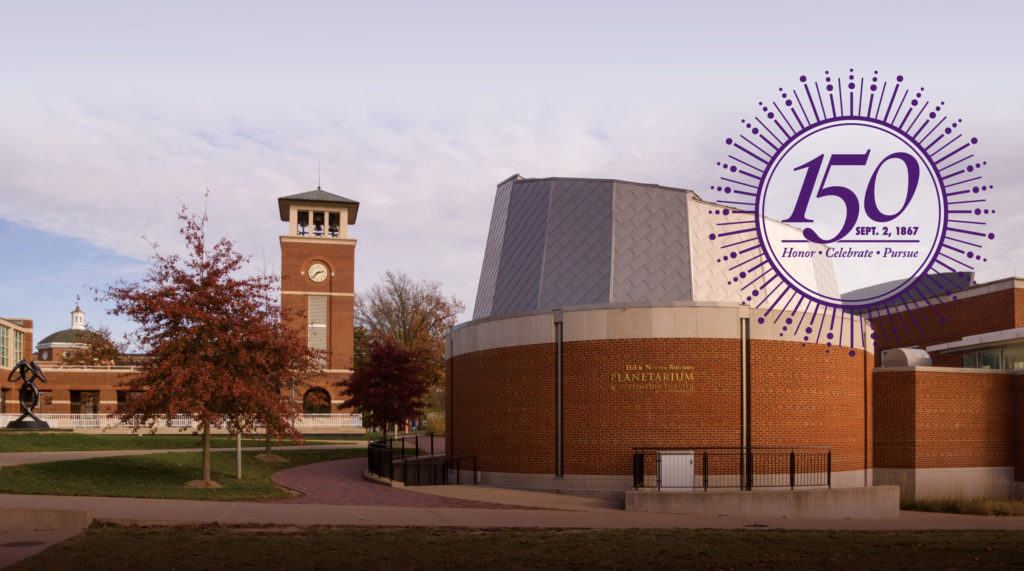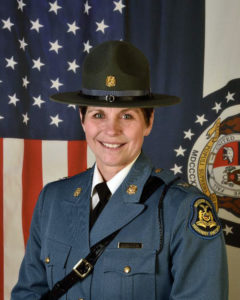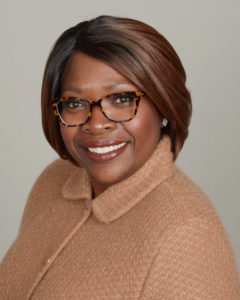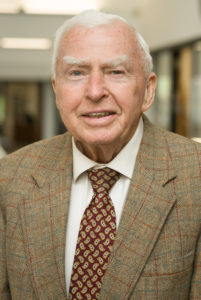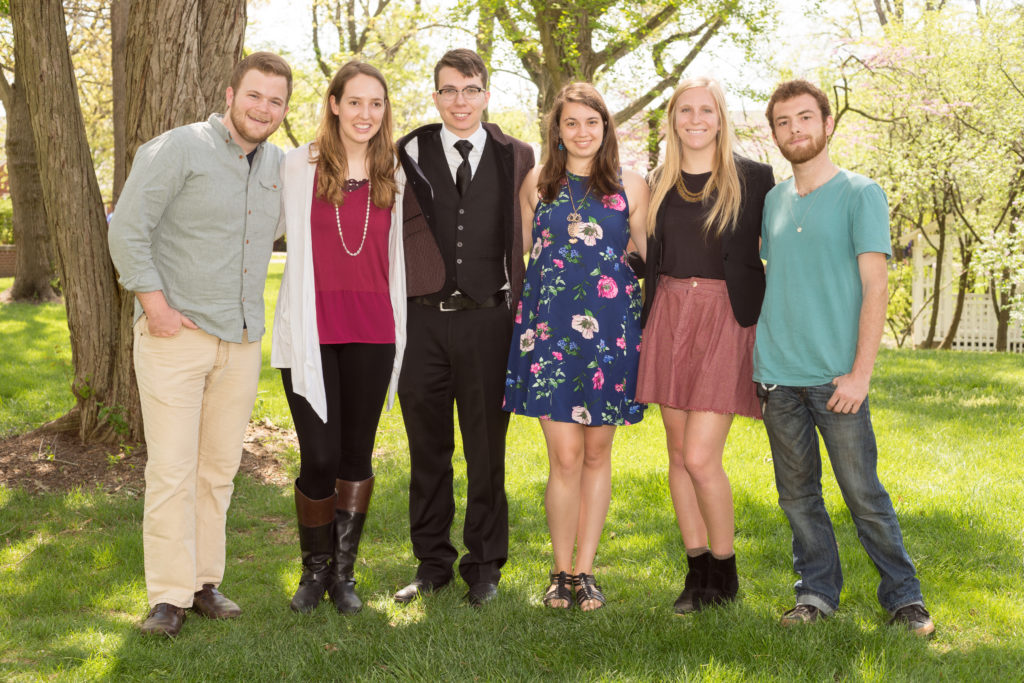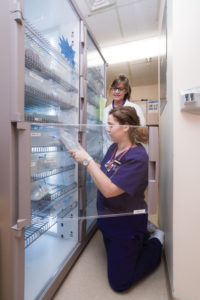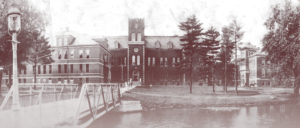 In 1867, classes at the North Missouri Normal School and Commercial College started on the first Monday in September. There was no outrage about beginning on a traditional three-day weekend, probably because Labor Day would not become a federal holiday for another 27 years. If the weather was particularly warm, as summer days in Missouri are known to be, those same students could not even cool off with an ice cold Coca-Cola, seeing as how that company did not start on the path to becoming one of the world’s most recognizable brands until 1886. Regardless of how the 144 students arrived in town, it surely was not by car since America’s first automobile manufacturer, the Duryea Motor Wagon Company, was more than two decades away from opening its doors.
In 1867, classes at the North Missouri Normal School and Commercial College started on the first Monday in September. There was no outrage about beginning on a traditional three-day weekend, probably because Labor Day would not become a federal holiday for another 27 years. If the weather was particularly warm, as summer days in Missouri are known to be, those same students could not even cool off with an ice cold Coca-Cola, seeing as how that company did not start on the path to becoming one of the world’s most recognizable brands until 1886. Regardless of how the 144 students arrived in town, it surely was not by car since America’s first automobile manufacturer, the Duryea Motor Wagon Company, was more than two decades away from opening its doors.
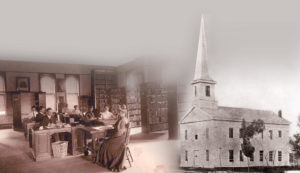 The University has been around longer than many of the amenities taken for granted today. Current students might shudder at the thought of something as archaic as dial-up internet access, but when the inaugural class came to campus Alexander Graham Bell was still nine years off from securing the first telephone patent. As the University prepares to celebrate its 150th anniversary, it is important to understand the historical context of the achievement and equally significant to realize sustained success is the result of generations of hard work and sound stewardship. In a century and a half, the University has grown from a small normal school, dedicated solely to teacher education, into a nationally renowned institution with alumni scattered across the globe. A common proverb for excellence is to note something is “the greatest thing since sliced bread,” but even referencing that American staple, which hit the shelves in 1928, fails to properly capture the grandeur of the University.
The University has been around longer than many of the amenities taken for granted today. Current students might shudder at the thought of something as archaic as dial-up internet access, but when the inaugural class came to campus Alexander Graham Bell was still nine years off from securing the first telephone patent. As the University prepares to celebrate its 150th anniversary, it is important to understand the historical context of the achievement and equally significant to realize sustained success is the result of generations of hard work and sound stewardship. In a century and a half, the University has grown from a small normal school, dedicated solely to teacher education, into a nationally renowned institution with alumni scattered across the globe. A common proverb for excellence is to note something is “the greatest thing since sliced bread,” but even referencing that American staple, which hit the shelves in 1928, fails to properly capture the grandeur of the University.
Joseph Baldwin’s Series of Fortunate Events
The first thing to keep in mind when considering the long and lustrous history of the University is to understand it almost never happened. Without the help of a few serendipitous events, there would be no milestone to celebrate.
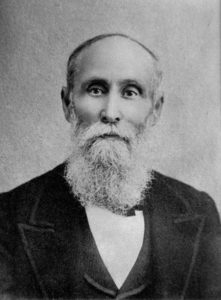 Joseph Baldwin was a native of Pennsylvania who taught in Missouri after receiving his bachelor’s degree. By 1866 he was the president of a seminary school in Indiana, but felt compelled to start his own institution. During his previous stint in the Show-Me State, Baldwin helped create the Missouri State Teachers Association. Through connections with state educational and political leaders, and at the urging of a family member who happened to live in town, Baldwin was encouraged to establish his school in Kirksville.
Joseph Baldwin was a native of Pennsylvania who taught in Missouri after receiving his bachelor’s degree. By 1866 he was the president of a seminary school in Indiana, but felt compelled to start his own institution. During his previous stint in the Show-Me State, Baldwin helped create the Missouri State Teachers Association. Through connections with state educational and political leaders, and at the urging of a family member who happened to live in town, Baldwin was encouraged to establish his school in Kirksville.
The final piece of the puzzle came as the result of another school’s misfortune. The Cumberland Academy was only open for about a year before going under in 1861. A second attempt to revive it was cut short when the Battle of Kirksville forced its closure on Aug. 6, 1862. Various churches made use of the building during the next several years, but it was not until Baldwin arrived in 1867 that it would again be used as a school.
Had the building not been available, or had Baldwin previously taught in another state, or his family member not moved to the area, Sept. 2, 1867 would be just another day in the history of Kirksville. Instead, it marks the beginning of an educational movement that has gotten stronger during the past 150 years.
A School By Any Other Name …
The quickest way to start a rift among alumni is to call the University by the “wrong” name. Since its inception, the proper name of the school has changed seven times. On average, that would be a name change about every 21 years, but some of the monikers were short lived. In just the second year, the name was abbreviated to simply North Missouri Normal School, which only lasted two years. The next designation, Missouri State Normal School of the First District, currently holds the record for the longest lasting handle at 49 years, narrowly beating out its successor, Northeast Missouri State Teachers College, which reigned for 48 years. Even though it is second in the record books, that era ranks first in the hearts of many alumni. Ironically, they refer to it as yet another name. For a certain generation, the school was and forever will be Kirksville State Teachers College.
“Even though KSTC was not an official University name, it was the University nickname adopted by many alumni from the 1920s through the 1960s,” said Denise Smith, director of alumni relations.
Yearbooks from the time display pictures of cheerleader sweaters and letterman jackets emblazoned with only an oversized K to acknowledge their allegiance, and many alumni still hold that alias in the highest regard. A walk down Franklin Street during the annual Homecoming parade will reveal more than a few KSTC sweatshirts and jackets.
When Truman State University became official in 1996 there was another period of adjustment since many had become accustomed to NMSU during the previous 24 years. The name was selected as an homage to the only Missourian to serve as president of the United States. Although Harry Truman had no significant ties to the University, let alone a degree from any college, he was a proponent of lifelong learning and public service. By all accounts, he would have embraced the spirit of the University’s vision statement to develop citizen-leaders committed to service, and the school’s association with him has come to be widely accepted as an appropriate tribute.
The Times They Are A-Changin’
The name is hardly the only thing to change at Truman in past 150 years. If not for alumnus and author Basil Brewer writing a school song entitled “The Purple and the White” in 1902, the University may have never adopted those colors. He was later rewarded with the naming of Brewer Hall in his honor, which hopefully lessened the blow when professor Gail Albright penned “Hail to the Bulldogs!” in 1974, a more popular song which is still played at University sporting events.
Alumni are constantly reminded attending the University makes them a “Bulldog Forever,” but the mascot was not forever a bulldog. Embraced in 1915, the bulldog has been associated with the University for a little more than two-thirds of the school’s existence, but it is difficult to imagine otherwise.
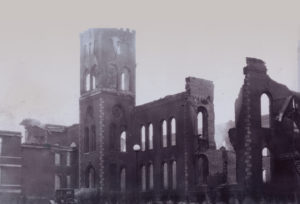 Even the physical aspects of the University have changed, sometimes drastically and at a moment’s notice. As beautiful as campus is today, some would argue it was at its peak nearly 100 years ago. After leaving the Cumberland Academy and establishing roots at the University’s current location, Old Baldwin Hall was the first structure to be completed. It sat behind a picturesque lake, and for nearly 30 years it was the only building. When a fire ravaged campus in 1924, the lake was emptied to put out the blaze. From that disaster, some of the bedrocks of the modern campus came into being. The drained lake made way for the area now known as the Quad. The footprint of Old Baldwin Hall became the Sunken Garden, and Kirk Memorial was established on the site of the scorched building’s tower.
Even the physical aspects of the University have changed, sometimes drastically and at a moment’s notice. As beautiful as campus is today, some would argue it was at its peak nearly 100 years ago. After leaving the Cumberland Academy and establishing roots at the University’s current location, Old Baldwin Hall was the first structure to be completed. It sat behind a picturesque lake, and for nearly 30 years it was the only building. When a fire ravaged campus in 1924, the lake was emptied to put out the blaze. From that disaster, some of the bedrocks of the modern campus came into being. The drained lake made way for the area now known as the Quad. The footprint of Old Baldwin Hall became the Sunken Garden, and Kirk Memorial was established on the site of the scorched building’s tower.
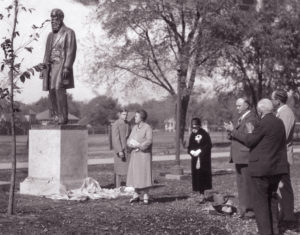 In the time since Old Baldwin Hall was alone on campus, several buildings and landmarks have been established. Some structures were purely decorative or commemorative, like the statue of Joseph Baldwin, erected in 1927 to celebrate his 100th birthday, or the Bell Wall, dedicated in 1967 as part of the University’s centennial celebration. The iconic clock tower, now synonymous with Truman to a generation of students and alumni, was installed just 25 years ago. A few buildings have come and gone, but many remain with long histories intact. In some instances, renovations brought new life, and since the redesign of Pickler Memorial Library in the early 1990s, many of the updates have incorporated contemporary additions with existing structures — the old and the new coming together to both acknowledge the past while allowing for functionality in the future.
In the time since Old Baldwin Hall was alone on campus, several buildings and landmarks have been established. Some structures were purely decorative or commemorative, like the statue of Joseph Baldwin, erected in 1927 to celebrate his 100th birthday, or the Bell Wall, dedicated in 1967 as part of the University’s centennial celebration. The iconic clock tower, now synonymous with Truman to a generation of students and alumni, was installed just 25 years ago. A few buildings have come and gone, but many remain with long histories intact. In some instances, renovations brought new life, and since the redesign of Pickler Memorial Library in the early 1990s, many of the updates have incorporated contemporary additions with existing structures — the old and the new coming together to both acknowledge the past while allowing for functionality in the future.
The Next 150 Years
Most of the University’s history remains rooted in teacher education. Additional programs were not added until 1968, and though that break from tradition may have seemed strange at the time, it was essential for the survival of the school.
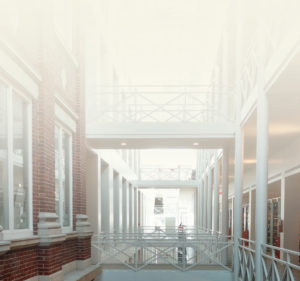 When the University mission changed, some programs were drastically altered or even eliminated in the late 1980s and early 1990s. Much like the choice to expand beyond teacher education, the changes were not always popular at the time. The difficult decisions made during the transition did ultimately bear fruit, proof of which can be seen in the accolades the University has continually piled up in the last 25 years. Regional recognition evolved into national rankings, and Truman has been hailed for a variety of reasons, including its emphasis on undergraduate education, the number of first-generation students enrolled, alumni who contribute to community service projects, and the success rates and earning potential of students 10 years after enrollment.
When the University mission changed, some programs were drastically altered or even eliminated in the late 1980s and early 1990s. Much like the choice to expand beyond teacher education, the changes were not always popular at the time. The difficult decisions made during the transition did ultimately bear fruit, proof of which can be seen in the accolades the University has continually piled up in the last 25 years. Regional recognition evolved into national rankings, and Truman has been hailed for a variety of reasons, including its emphasis on undergraduate education, the number of first-generation students enrolled, alumni who contribute to community service projects, and the success rates and earning potential of students 10 years after enrollment.
“For an institution to be around for 150 years, the institution has had to figure out not just how to survive, but how to thrive during ever-changing times,” University President Susan L. Thomas said. “Celebrating a sesquicentennial anniversary is a clear indication that Truman takes challenges head on. The University is willing to take a hard look at itself and make the strategic and thoughtful changes necessary to advance the institution.”
Change on a college campus may be gradual, but it is inevitable. To meet the challenges of the future, adjustments will surely need to be considered from any number of angles. Developments in society might influence student interest, and advancements in technology could alter trends in education in ways not yet known. If history is any indication, Truman will be ready for whatever comes next.
“It’s always scary to change, but we wouldn’t be the amazing University we are today if we hadn’t changed,” Thomas said. “By remaining deeply committed to meeting contemporary needs, we ensure Truman will remain a powerful educational force for the next 150 years.”
We are Truman and Northeast, and KSTC …
Part of the reason alumni and friends identify so resolutely with certain aspects of the University, like a name, building or program, is because for many, their time on campus was an intense, immersive experience. Students transform a lot in a relatively short period of time. The typical college experience is a four-year snapshot frozen in time. It is what makes reminiscing with classmates decades after graduation so enjoyable.
A look at the timeline of the University’s history shows an arc of purposeful growth, and every change implemented has been done in the interest of providing the best possible education to students. Each generation builds on the achievements of those that came before it, and the accomplishments of today’s students are due in part to the paths carved out by their predecessors. Any future evolution of the University is not an indictment of previous eras, but rather an endorsement of their successes and the next logical step in continuing to provide an education that prepares students to be good citizens and leaders. That is one thing that will never change.

